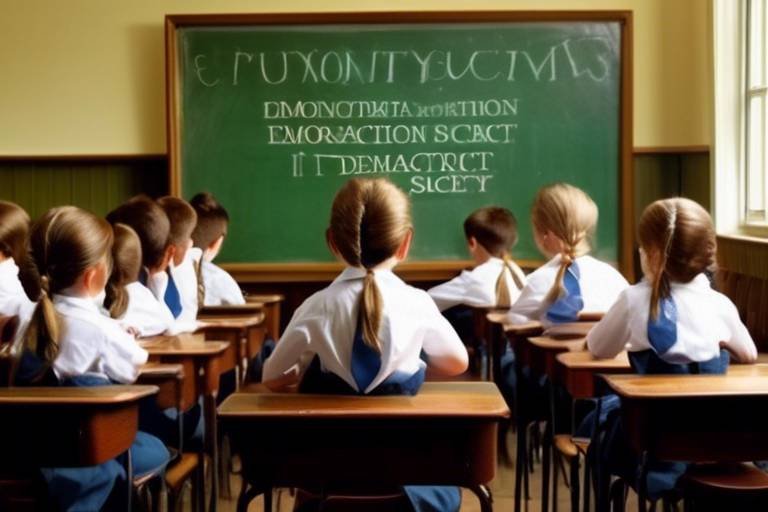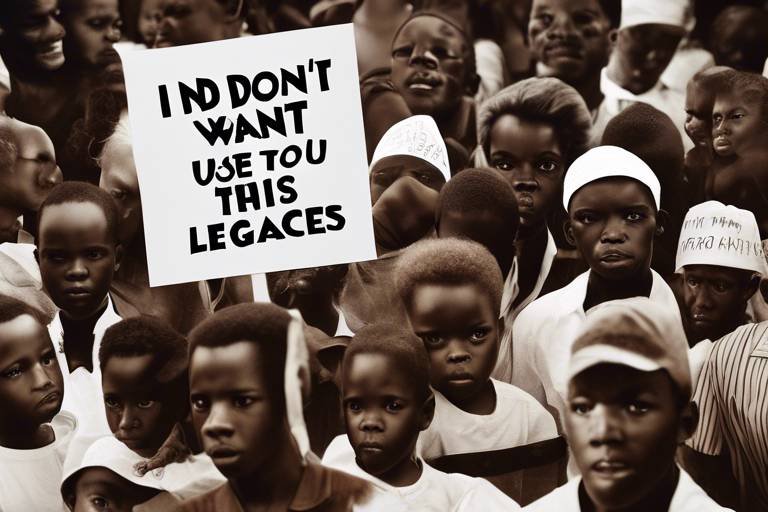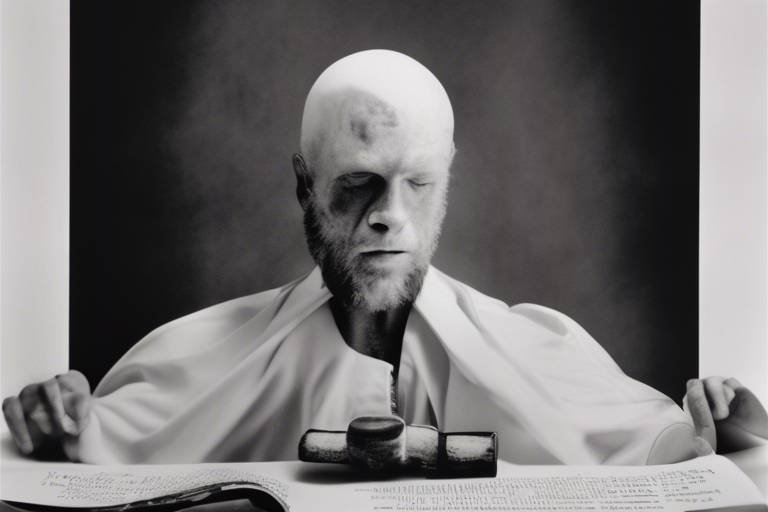The Morality of Private Education in a Democratic Society
This article explores the ethical implications of private education within democratic frameworks, examining its impact on equality, accessibility, and the overall health of the educational landscape.
Education is not just a means to acquire knowledge; it's the very foundation that supports a thriving democracy. Imagine a society where every individual is well-informed, actively participating in civic duties, and holding their leaders accountable. This is the power of education! However, when private education comes into play, it raises some eyebrows. Are we fostering informed citizens, or are we creating a divide where only a select few have access to quality education? The potential risks posed by private education can be significant, as they may lead to a fragmented society where civic engagement is unevenly distributed.
The stark reality is that private education often exacerbates social inequalities. Picture this: a talented child from a low-income family is unable to attend a prestigious private school simply because their parents cannot afford the exorbitant fees. This financial barrier not only limits access to quality education but also stifles social mobility. In a democratic society, where the ideal is for everyone to have an equal shot at success, how can we justify a system that perpetuates such disparities? The implications are profound, as they contribute to a cycle of poverty that is hard to break.
When we think about education, we often envision it as a unifying force. However, segregation in education can lead to divisions within society. Private schooling tends to create enclaves of privilege, where students are isolated from their peers in public schools. This separation can weaken community bonds and diminish societal harmony. When children grow up in homogeneous environments, they miss out on the rich tapestry of diversity that characterizes a healthy democratic society. The result? A lack of understanding and empathy between different social groups, which can lead to conflict and mistrust.
Socioeconomic disparities play a significant role in educational access. It’s a sad truth that wealth often dictates the quality of education one receives. Families with higher incomes can afford to send their children to elite private institutions, while those from lower-income backgrounds are left to navigate an often underfunded public school system. This disparity not only affects educational outcomes but also perpetuates a cycle of inequality that can last for generations. The question we must ask ourselves is: how can we create a fair and equitable educational landscape in a democracy?
Another critical aspect of private education is its potential to promote cultural homogeneity. Many private institutions may have specific cultural values or religious affiliations, which can lead to a lack of diversity in perspectives. This exclusivity can undermine the principles of inclusivity and representation that are vital in a democratic society. If our educational systems do not reflect the rich diversity of our communities, how can we prepare future generations to engage with a world that is multifaceted and complex?
Government policies play a crucial role in shaping the educational landscape. Regulations can ensure fairness in education and mitigate the impacts of private schooling. For instance, implementing policies that require private institutions to adhere to certain standards can help level the playing field. This way, we can work towards a system where all students, regardless of their background, have access to quality education. The challenge lies in finding the right balance between allowing educational choice and ensuring that it doesn’t come at the expense of social equity.
The concept of educational choice raises a plethora of ethical questions. On one hand, parents should have the right to choose the best educational path for their children. On the other hand, is it fair to prioritize individual preferences over societal needs? This tension between parental rights and social responsibility is complex. We must consider whether allowing families to opt for private education undermines the collective good that public education aims to achieve. After all, a strong democracy relies on an educated populace that can engage in meaningful dialogue and collaboration.
Balancing parental rights with societal needs is no easy feat. Parents naturally want what’s best for their children, which often translates into seeking the best education possible. However, this individual pursuit can clash with the broader goal of fostering an equitable society. It’s a delicate dance where the rights of the few can sometimes overshadow the needs of the many. How do we navigate this moral maze? By fostering open discussions and finding common ground that respects both parental choices and the collective good.
As society evolves, so does the landscape of private education. We are witnessing shifts in demographics, technology, and educational philosophies that could reshape how we view private institutions. Will we see a rise in hybrid models that blend the best of private and public education? Or will the divide deepen, leading to greater disparities? The future holds many possibilities, and with it comes the responsibility to ensure that democracy and equality in education remain at the forefront of our discussions.
- What are the main ethical concerns regarding private education?
Private education can exacerbate social inequalities, limit access to quality education, and promote cultural homogeneity. - How does socioeconomic status affect educational access?
Wealthier families can afford private schooling, while low-income families may struggle with underfunded public schools, perpetuating a cycle of inequality. - What role does government regulation play in education?
Government policies can help ensure fairness in education and mitigate the impact of private schooling on social equity. - How can we balance parental rights with social responsibility?
Open discussions and finding common ground are essential in navigating the complex relationship between individual choices and societal needs.

The Role of Education in Democracy
Education serves as the bedrock of any democratic society, acting as a catalyst for informed citizenship and active civic engagement. It’s not just about filling young minds with facts and figures; it’s about nurturing critical thinkers who can challenge the status quo and contribute to the democratic process. When we think about democracy, we often picture a bustling town hall meeting or a vibrant debate on social issues. But what fuels these discussions? It’s a well-educated populace, equipped with the knowledge and skills necessary to navigate complex societal challenges.
In a democratic framework, education empowers individuals to make informed decisions, participate in governance, and advocate for their rights. This is where the ethical implications of private education come into play. While private institutions may offer tailored curricula and smaller class sizes, they can also create a divide that undermines the very essence of democracy. Imagine a society where only a select few have access to quality education; this not only limits opportunities for many but also stifles the diversity of thought that is crucial for a thriving democracy.
Furthermore, the role of education extends beyond individual benefit; it fosters a sense of community and shared responsibility. When students from various backgrounds come together in public schools, they learn to appreciate different perspectives, which is vital for social cohesion. However, private education often segregates students based on socioeconomic status, leading to a lack of understanding and empathy across different social groups. This segregation can create an “us vs. them” mentality, where the privileged remain insulated from the challenges faced by the less fortunate.
To illustrate the impact of education on democracy, consider the following:
| Aspect | Public Education | Private Education |
|---|---|---|
| Access | Open to all, regardless of background | Limited to those who can afford it |
| Diversity | Encourages a mix of cultures and ideas | Often homogenous, reflecting specific values |
| Social Responsibility | Promotes civic engagement and community service | Focuses on individual achievement |
As we navigate the complexities of education in a democratic society, it becomes clear that the implications of private education are profound. It’s essential to ask ourselves: Are we creating a system that promotes equality and inclusivity, or are we fostering divisions that threaten the very foundation of democracy? The answers to these questions will shape the future of our educational landscape and, ultimately, our society.
- Why is education important in a democracy? Education equips citizens with the knowledge to make informed decisions and participate actively in governance.
- How does private education affect social equality? Private education can exacerbate social inequalities by limiting access to quality education based on financial means.
- What role does government regulation play in education? Government regulation can help ensure fairness and equity in education, preventing the negative impacts of private schooling.
- Can private education coexist with public education in a democratic society? Yes, but it requires careful regulation to ensure that private institutions do not undermine public education's role in promoting equality.

When we talk about education in a democratic society, we often envision a level playing field where every child has the opportunity to succeed. However, the reality is starkly different. Private education often creates a significant divide, exacerbating existing social inequalities. The financial barriers associated with private schooling can limit access to quality education, leaving many families trapped in a cycle of disadvantage. Just think about it: if a child’s potential is determined by their family’s income, how can we claim to live in a fair and equitable society?
The implications of this inequality are profound. Children from wealthier families can attend prestigious private schools, which often offer superior resources, smaller class sizes, and enriched curricula. In contrast, those from lower-income backgrounds are frequently left with underfunded public schools that struggle to provide even the most basic educational services. This disparity not only affects academic achievement but also impacts social mobility. A child born into a low-income family may find it nearly impossible to break free from the constraints of their socioeconomic status if they are denied access to quality education.
Moreover, the impact of these inequalities can be seen in the long term. A well-educated workforce is essential for a thriving economy, yet when a significant portion of the population is denied proper educational opportunities, it creates a ripple effect that can stifle innovation and growth. According to recent studies, regions with high levels of educational inequality often experience slower economic development and increased social unrest. It’s a vicious cycle that can be hard to break.
To illustrate this point further, consider the following table that highlights the stark differences in educational funding between private and public institutions:
| Type of School | Average Annual Tuition/Funding | Student-Teacher Ratio | Extracurricular Opportunities |
|---|---|---|---|
| Private Schools | $20,000 - $50,000 | 10:1 | Extensive |
| Public Schools | $10,000 (funded by taxpayers) | 25:1 | Limited |
As shown in the table, the financial investment in private education far surpasses that of public schools. This disparity not only affects the quality of education but also the overall development of children. When students are segregated based on their ability to pay, it fosters an environment of elitism and exclusion, where the rich get richer and the poor are left behind. Is this the kind of society we want to build?
Additionally, the issue of educational inequality extends beyond mere numbers. It’s about the opportunities that are afforded to children based on their backgrounds. Children attending private schools often have access to advanced placement courses, college counseling, and networking opportunities that can pave the way for future success. In contrast, public school students may not even have access to the same level of guidance, leaving them at a disadvantage when applying for colleges or jobs.
In conclusion, the inequality in access to education is not just a statistic; it’s a reality that affects millions of children and their families. It’s a pressing issue that demands our attention and action. As we reflect on the importance of education in a democratic society, we must ask ourselves: how can we ensure that every child, regardless of their background, has the chance to succeed? The answer lies in addressing these disparities head-on and advocating for a more equitable educational system for all.
- What are the main causes of inequality in access to education?
Inequality in access to education is primarily caused by socioeconomic disparities, funding differences between private and public schools, and systemic barriers that prevent low-income families from accessing quality education.
- How does private education affect social mobility?
Private education can enhance social mobility for those who can afford it, while simultaneously limiting opportunities for those who cannot, thereby perpetuating cycles of poverty and inequality.
- What can be done to reduce educational inequality?
To reduce educational inequality, policies should focus on equitable funding for public schools, increased access to resources for low-income families, and initiatives that promote inclusivity and diversity in education.

When we think about education, we often picture classrooms filled with eager faces, teachers passionately imparting knowledge, and students forming friendships that can last a lifetime. However, the reality of private education can sometimes shatter this ideal, leading to significant impacts on social cohesion. In a democratic society, where the fabric of community is woven from diverse threads, the rise of private schooling can create rifts that challenge our collective harmony.
Private schools often cater to specific demographics, attracting families who can afford the tuition fees and who share similar socioeconomic backgrounds. This phenomenon can lead to a segregation of experiences, where students from affluent families interact primarily with peers who have similar privileges. Consequently, this can foster an environment where understanding and empathy for different social realities diminish. Imagine a community where children grow up in isolated bubbles, shielded from the struggles and triumphs of their less fortunate peers. This not only limits their worldview but also undermines the very essence of democracy, which thrives on mutual respect and understanding.
Furthermore, the division created by private education can lead to a lack of shared experiences among community members, resulting in a fractured society. When children are educated in separate systems, they miss out on the opportunity to engage with diverse perspectives and backgrounds. This lack of interaction can breed misunderstanding and, ultimately, conflict. For instance, how can we expect future leaders to unite a country if they have never been exposed to the varied narratives that shape our society?
To illustrate this point, consider the following table, which outlines the disparities in social interactions among students from different educational backgrounds:
| Aspect | Private School Students | Public School Students |
|---|---|---|
| Exposure to Diversity | Limited | High |
| Community Engagement | Low | High |
| Shared Experiences | Minimal | Rich |
As we can see, the stark differences in exposure to diversity and community engagement can lead to a generation of individuals who struggle to connect with one another. This lack of shared experiences not only affects personal relationships but also has broader implications for societal unity. When we cultivate environments where students are isolated from one another, we risk creating a future where collaboration and understanding are mere afterthoughts.
In conclusion, the impact of private education on social cohesion cannot be understated. As we navigate the complexities of a democratic society, it is vital to recognize the importance of inclusive educational practices that promote interaction among diverse groups. After all, a truly democratic society flourishes when its citizens are equipped with the tools to understand, empathize, and collaborate with one another.
- What is the primary concern regarding private education and social cohesion? The primary concern is that private education can lead to segregation, limiting students' exposure to diverse perspectives and experiences.
- How does private schooling affect community engagement? Private schooling often results in lower levels of community engagement among students, as they may not interact with peers from different socioeconomic backgrounds.
- What are the broader implications of educational segregation? Educational segregation can lead to misunderstandings and conflicts in society, undermining the democratic values of unity and cooperation.

Socioeconomic status (SES) is a significant factor that shapes educational access and outcomes in profound ways. In a democratic society, where the ideal is to provide equal opportunities for all, the reality often tells a different story. Families with higher SES enjoy a plethora of advantages that can dramatically enhance their children's educational experiences. These advantages range from access to better resources, such as advanced tutoring and extracurricular activities, to the ability to afford private schooling, which often boasts smaller class sizes and more individualized attention.
On the flip side, children from lower SES backgrounds frequently find themselves at a disadvantage. They may attend underfunded public schools, where resources are scarce, and class sizes are large. This disparity creates a vicious cycle, where the lack of quality education limits future employment opportunities, perpetuating the cycle of poverty. It's a harsh reality that raises an important question: How can we break this cycle?
Research shows that educational attainment is closely linked to family income. For instance, a study revealed that students from low-income families are less likely to graduate from high school compared to their wealthier peers. This gap in educational achievement not only affects individual futures but also has broader implications for society. A less educated workforce can lead to reduced economic growth and increased social unrest, creating a ripple effect that impacts everyone.
Furthermore, the influence of SES extends beyond just academics. It shapes the environment in which children learn. For example, children from affluent families often grow up in neighborhoods with safe parks, libraries, and community centers, fostering a culture of learning and engagement. In contrast, those from lower SES backgrounds may face challenges such as crime, lack of safe spaces, and limited access to educational materials. This discrepancy can stifle a child's natural curiosity and desire to learn, leading to a significant gap in cognitive development.
To illustrate the impact of socioeconomic status on educational access, consider the following table:
| Socioeconomic Status | Access to Quality Education | Extracurricular Opportunities | Long-term Outcomes |
|---|---|---|---|
| High SES | High | Abundant | Higher graduation rates, better job prospects |
| Middle SES | Moderate | Some | Average graduation rates, varied job prospects |
| Low SES | Low | Limited | Lower graduation rates, limited job prospects |
This table highlights the stark contrast in educational access and outcomes based on socioeconomic status. It’s evident that children from lower SES backgrounds are not only facing barriers to quality education but are also deprived of enriching experiences that can significantly enhance their learning journey.
In conclusion, the influence of socioeconomic status on education is a critical issue that needs addressing. As we strive for a more equitable educational landscape, it is essential to recognize and dismantle the barriers that limit access for those in lower SES brackets. After all, in a truly democratic society, every child deserves the opportunity to succeed, regardless of their background.
- How does socioeconomic status affect educational outcomes?
Socioeconomic status impacts access to quality education, resources, and opportunities, leading to disparities in academic achievement. - What can be done to improve educational access for low SES families?
Policies that increase funding for public schools, provide scholarships, and enhance community resources can help bridge the gap. - Are private schools better than public schools?
While private schools often have more resources, the quality of education can vary widely in both sectors, and many public schools are excellent.

When we think about private schools, a picture often comes to mind of well-manicured lawns, small class sizes, and a curriculum tailored to the elite. However, lurking beneath this polished exterior is a significant issue: cultural homogeneity. Many private institutions tend to attract families from similar socioeconomic backgrounds, leading to a lack of diversity in both student body and faculty. This can create an environment where certain values and cultural narratives dominate, potentially sidelining the rich tapestry of experiences that public schools often provide.
Imagine a classroom where every student shares the same background, beliefs, and even aspirations. While this might foster a sense of community among those students, it can also lead to an echo chamber effect, where differing viewpoints are not just absent but actively discouraged. This cultural uniformity can stifle critical thinking and limit students' exposure to the broader world. In a democratic society, where the exchange of diverse ideas is crucial for growth and understanding, this poses a serious concern.
Moreover, the implications of cultural homogeneity extend beyond the classroom. Students from diverse backgrounds often bring unique perspectives and insights that enrich discussions, challenge assumptions, and foster empathy. When these voices are missing, we risk producing graduates who are ill-equipped to navigate a world that is anything but uniform. The question then arises: Are we preparing students for a pluralistic society, or are we merely reinforcing existing divides?
To illustrate this point further, consider the following table that highlights the potential impacts of cultural homogeneity in private schools:
| Impact | Description |
|---|---|
| Lack of Empathy | Students may struggle to understand or relate to experiences outside their own cultural context. |
| Limited Critical Thinking | With fewer diverse opinions, students may not develop strong analytical skills necessary for problem-solving. |
| Social Segregation | Graduates may find it challenging to integrate into diverse workplaces or communities. |
In conclusion, while private schools can offer certain advantages, the risk of cultural homogeneity is a significant drawback that cannot be overlooked. As we navigate the complexities of education in a democratic society, it’s essential to consider how we can foster environments that celebrate diversity and inclusivity. After all, the strength of a democracy lies in its ability to embrace and learn from a multitude of voices.
- What is cultural homogeneity? Cultural homogeneity refers to a lack of diversity within a group, where members share similar backgrounds, beliefs, and values.
- How does cultural homogeneity affect education? It can lead to limited perspectives, reduced empathy, and hinder critical thinking skills among students.
- Are private schools more homogeneous than public schools? Generally, yes, private schools often attract families from similar socioeconomic backgrounds, leading to less diversity.
- What can be done to promote diversity in private schools? Encouraging admissions policies that prioritize diversity and inclusivity can help create a more balanced environment.

Government regulation plays a crucial role in shaping the educational landscape, especially in the context of private education within a democratic society. Regulations can serve as a balancing act, ensuring that all students, regardless of their socioeconomic background, have access to quality education. Without effective oversight, private institutions might prioritize profit over educational integrity, leading to disparities that undermine the very principles of democracy.
One of the primary functions of government regulation is to establish minimum standards for educational quality. These standards ensure that private schools are not just operating as businesses, but are genuinely contributing to the educational development of their students. For instance, regulations can mandate curriculum requirements, teacher qualifications, and facilities standards. This creates a level playing field where all educational institutions, public or private, must meet certain benchmarks, thus promoting equity in education.
Moreover, government intervention can help mitigate the risks of segregation that often arise from a heavily privatized education system. When families with higher incomes can afford to send their children to elite private schools, it creates a divide that can lead to social fragmentation. By implementing policies that promote inclusivity, such as scholarship programs or funding for underprivileged students, governments can help bridge the gap between different socio-economic groups. This not only enhances social cohesion but also enriches the educational experience for all students.
To illustrate the importance of regulation, consider the following table that outlines the potential impacts of government regulation on private education:
| Regulation Type | Potential Impact |
|---|---|
| Curriculum Standards | Ensures a baseline of educational quality across all schools. |
| Teacher Qualifications | Promotes professional standards and accountability in teaching. |
| Funding for Scholarships | Increases access for low-income families to quality private education. |
| Oversight of Admissions Policies | Prevents discriminatory practices in student admissions. |
Additionally, government regulation can help maintain transparency in the private education sector. By requiring schools to publish performance data, financial information, and student outcomes, families can make more informed choices about where to send their children. This transparency is essential in a democratic society, where citizens should have access to information that affects their lives and the lives of their children.
However, the challenge lies in striking a balance between regulation and autonomy. While it is crucial to impose necessary regulations, overly stringent rules can stifle innovation and limit the unique offerings that private schools may provide. Thus, the conversation around government regulation in education must be ongoing, adapting to new challenges and opportunities as they arise.
In conclusion, the role of government regulation in private education is multifaceted and essential. It not only safeguards the rights of students and families but also promotes a more equitable educational landscape. As we navigate the complexities of private education in a democratic society, ongoing dialogue and thoughtful regulation will be key to ensuring that all children have the opportunity to succeed.
- Why is government regulation important in private education?
Government regulation helps ensure that all educational institutions meet minimum standards, promoting equity and quality in education. - How can regulation mitigate inequality in education?
By implementing policies such as scholarship programs, governments can help underprivileged students access quality education. - What are the risks of insufficient regulation?
Lack of regulation can lead to disparities in educational quality and segregation based on socioeconomic status. - How does regulation promote transparency?
Regulations that require schools to disclose performance data empower families to make informed decisions about their children's education.

The notion of educational choice is a hot topic in discussions about the morality of private education. On one hand, it champions the idea that parents should have the freedom to select the best educational path for their children, tailored to their unique needs and preferences. On the other hand, this freedom raises profound ethical questions about the implications of such choices on society at large. Are we prioritizing individual desires over the collective good? This dilemma is akin to a double-edged sword, where the benefits of choice can sometimes cut into the fabric of social equity.
One of the primary arguments in favor of educational choice is the belief in parental rights. Many parents argue that they know their children best and should have the authority to choose the environment that will foster their child's growth. This perspective is rooted in the idea of personal responsibility and the belief that families should have the autonomy to make decisions that align with their values and aspirations. However, this individualistic approach can lead to a stark contrast in educational quality and access, particularly when financial resources come into play.
Conversely, the ethical implications of such choices cannot be ignored. When families choose private education, they often opt out of the public system, which can lead to a drain on resources and support for public schools. This raises a critical question: does the pursuit of individual choice come at the expense of societal responsibility? If a significant number of families withdraw from public education, the system may struggle to provide adequate resources for those who remain, potentially perpetuating cycles of disadvantage and inequality.
To illustrate this ethical dilemma, consider the following table that summarizes the pros and cons of educational choice:
| Pros of Educational Choice | Cons of Educational Choice |
|---|---|
| Empowers parents to choose the best fit for their child | Can exacerbate inequality in educational access |
| Encourages competition among schools | May lead to underfunding of public education |
| Allows for diverse educational philosophies | Potentially fosters segregation based on socioeconomic status |
Moreover, the debate extends to the impact on social cohesion. When families segregate into private institutions, the shared experiences that public schools foster may diminish. This can lead to a society where individuals are less connected, and community bonds weaken. The classroom is not just a place for academic learning; it's a melting pot of cultures, beliefs, and ideas. When we opt out of this shared experience, we risk creating an echo chamber where only certain perspectives are valued.
Ultimately, the ethical debate surrounding educational choice is a complex and nuanced issue. It challenges us to consider the balance between individual rights and the collective good. As we navigate this landscape, it is essential to engage in conversations that prioritize not just personal freedom, but also the broader implications of our choices on society. In a democratic context, the question remains: how do we ensure that the right to choose does not come at the cost of equality and access for all?
- What are the main arguments for educational choice? Proponents argue that it empowers parents, encourages competition, and allows for diverse educational philosophies.
- What are the main concerns regarding educational choice? Critics point out that it can exacerbate inequality and lead to underfunding of public schools.
- How does educational choice affect social cohesion? It may lead to segregation and weaken community bonds as families opt for private institutions.
- What is the role of government in regulating educational choice? Government policies can help ensure fairness and equity in education, balancing parental rights with social responsibility.

When it comes to the education of children, the debate between parental rights and social responsibility is a complex and often contentious issue. On one hand, parents naturally want the best for their children, which often leads them to seek out private education options that promise superior resources, smaller class sizes, and tailored curricula. However, this pursuit can sometimes overshadow the broader implications of such choices on society as a whole. Are we prioritizing individual desires over the collective good?
Consider this: when families opt for private schooling, they are often making a statement about their values and priorities. They may believe that a private institution can provide a more enriching environment for their child, yet this decision can inadvertently contribute to a fragmented educational landscape. The question arises: at what point does the right to choose become a burden on the social fabric? This dilemma is akin to a double-edged sword; while parents are exercising their rights, they may also be perpetuating a cycle of inequality that affects the community.
Furthermore, the implications of private education on social responsibility cannot be overlooked. When children are educated in isolated environments, they miss out on the rich tapestry of experiences that come from interacting with peers from diverse backgrounds. This lack of exposure can lead to a form of cultural homogeneity, where shared values and experiences are limited to a narrow spectrum. In a democratic society, where the ideal is to cultivate informed and engaged citizens, this can pose a significant risk. It raises the question: how do we prepare future generations to navigate a world that is inherently diverse if they are shielded from that reality during their formative years?
To illustrate the potential consequences of prioritizing parental rights over social responsibility, let’s consider a few key points:
- Segregation of Opportunities: When families choose private education, they may inadvertently segregate themselves from the broader community, leading to a lack of understanding and empathy towards different social groups.
- Resource Allocation: Public schools often suffer from decreased funding when families opt for private education, resulting in fewer resources for those who remain in the public system.
- Social Mobility: The emphasis on private schooling can hinder social mobility, as those without the financial means to pay for such education are left with limited options.
In conclusion, the tension between parental rights and social responsibility is not merely a philosophical debate; it has real-world implications that affect the very fabric of our democratic society. As we navigate this complex landscape, it becomes crucial to engage in conversations that consider both individual desires and the collective good. Ultimately, fostering a sense of community and shared responsibility should be at the forefront of our educational priorities.
- What is the main concern regarding parental rights in education? The primary concern is that prioritizing parental choice can lead to increased inequality and segregation in educational opportunities.
- How does private education impact social cohesion? Private education can create divisions within society, as it often separates students based on socioeconomic status, leading to a lack of understanding and empathy among different groups.
- What role does government play in balancing these rights? Government regulation can help ensure that all students have access to quality education, regardless of their family's financial status, thereby promoting fairness and equality.

As we look towards the horizon, the future of private education is a topic that stirs a mix of excitement and concern. With the rapid evolution of technology, changing societal norms, and shifting economic landscapes, private education is poised to undergo significant transformations. But what does this mean for our democratic values and the principle of equality in education? Is it a beacon of hope or a potential pitfall?
One of the most striking trends is the rise of online and hybrid learning models. These options have made private education more accessible to families who previously couldn't afford it. Imagine a world where a child from a rural area can attend a prestigious private school virtually, breaking down geographical barriers. However, while this innovation is promising, it also raises questions about the quality of education and the potential for further stratification. Will the digital divide leave some students behind, or will it pave the way for a more inclusive educational environment?
Additionally, we are witnessing a growing emphasis on personalized learning. Private schools are increasingly adopting tailored curricula that cater to individual student needs, interests, and learning styles. This shift could revolutionize how education is delivered, making it more engaging and effective. However, it also raises ethical considerations about the potential for elitism. Will only those who can afford such personalized education benefit, or will it become a standard practice that enriches the educational experience for all?
Moreover, the conversation around diversity and inclusion in private education is evolving. Many institutions are beginning to recognize the importance of fostering a diverse student body. This change could lead to a richer educational experience for all students, as they learn from peers with different backgrounds and perspectives. However, the challenge remains: how can private schools ensure they are genuinely inclusive rather than merely paying lip service to the idea of diversity?
In terms of regulation, the future may bring more stringent government oversight of private educational institutions. As public concern grows about the role of private education in perpetuating inequality, policymakers might feel compelled to establish guidelines that ensure fair access and quality standards. This could be a double-edged sword; while it may help level the playing field, it could also stifle the very innovation that makes private education appealing.
Ultimately, the future of private education will likely be shaped by a complex interplay of parental choice, government policy, and societal values. As families navigate their options, they must weigh the benefits of private education against the broader implications for community cohesion and social equity. Will we see a future where private education complements public systems, or will it create further divides in our society?
As we ponder these questions, it’s essential to remain engaged in the dialogue about the direction of education in our democracy. The choices we make today will undoubtedly influence the landscape of private education for generations to come.
- What is the primary concern regarding private education in a democratic society?
The main concern is that private education can exacerbate social inequalities, limiting access to quality education for low-income families and undermining the principle of equal opportunity.
- How does technology influence the future of private education?
Technology, particularly online and hybrid learning models, has the potential to make private education more accessible but also raises concerns about the digital divide and educational quality.
- Will government regulation of private education increase?
As public concern about educational inequality grows, it is likely that there will be more government oversight to ensure fair access and maintain quality standards in private institutions.
- What role does diversity play in the future of private education?
Increasingly, private schools are recognizing the importance of diversity, which could enrich the educational experience but also requires genuine commitment to inclusivity.
Frequently Asked Questions
- What is the role of education in a democratic society?
Education serves as the backbone of democracy, fostering informed and engaged citizens. It equips individuals with the knowledge and skills necessary to participate actively in civic life. However, when private education becomes prevalent, it can create disparities that threaten the democratic ideal of equal opportunity for all.
- How does private education affect social inequality?
Private education often deepens social inequalities by creating financial barriers that limit access to quality schooling. Families with fewer resources may find it challenging to provide their children with the same educational opportunities available to wealthier families, which can hinder social mobility and perpetuate cycles of poverty.
- What are the implications of educational segregation?
Segregation in education can lead to fractured communities and reduced social cohesion. When students from different backgrounds are separated, it fosters divisions and can diminish understanding and empathy among diverse groups. This segregation can undermine the very fabric of a democratic society, which thrives on inclusivity.
- How does socioeconomic status influence educational access?
Socioeconomic status plays a crucial role in determining access to quality education. Wealthier families can afford private schooling, while those with limited means often rely on underfunded public schools. This disparity creates a gap in educational outcomes, ultimately affecting future opportunities for those from lower socioeconomic backgrounds.
- Do private schools promote cultural homogeneity?
Yes, private schools may foster specific cultural values that can lead to a lack of diversity. This cultural homogeneity can undermine efforts to create an inclusive educational environment, as students may not be exposed to a wide range of perspectives and experiences that reflect the broader society.
- What role does government regulation play in education?
Government regulations are vital in ensuring fairness in education. They can help create a level playing field by setting standards for both public and private institutions, thus mitigating the negative impacts of private schooling on equality and accessibility in education.
- What are the ethical implications of educational choice?
The debate over educational choice raises significant ethical questions. While parents may wish to choose the best educational option for their children, this choice can come at the expense of the collective good. It's essential to balance parental rights with the need for a fair and equitable educational system that serves all members of society.
- How do parental rights conflict with social responsibility in education?
Balancing parental rights with social responsibility is a complex issue. While parents have the right to choose their children's education, this choice can sometimes undermine the public education system and the collective interests of society. Striking a balance is crucial for fostering an equitable educational landscape.
- What does the future hold for private education?
The future of private education is likely to evolve as societal values change. Trends such as increasing demand for inclusivity and equity may shape how private institutions operate. It's essential to consider the moral implications of these trends to ensure that education remains a vehicle for equality in a democratic society.



















